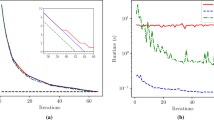Abstract
It is a problem in automotive configuration to determine the minimum number of test vehicles which are needed for testing a given set of equipment options. This problem is related to the minimum set cover problem, but with the additional restriction that we can not enumerate all vehicle variants since in practice their number is far too large for each model type. In this work we illustrate different use cases of minimum set cover computations in the context of automotive configuration. We give formal problem definitions and we develop different approximate (greedy) and exact algorithms. Based on benchmarks of a German premium car manufacturer we evaluate our different approaches to compare their time and quality and to determine tradeoffs.
R. Walter and T. Kübart—Contributed equally to this work.
Access this chapter
Tax calculation will be finalised at checkout
Purchases are for personal use only
Similar content being viewed by others
References
Glucose 2.1. http://www.labri.fr/perso/lsimon/glucose/. Accessed Sept 2015
IBM ILOG CPLEX Optimizer. http://www-01.ibm.com/software/commerce/optimization/cplex-optimizer/index.html. Accessed Sept 2015
Barnhart, C., Johnson, E.L., Nemhauser, G.L., Savelsbergh, M.W.P., Vance, P.H.: Branch-and-price: column generation for solving huge integer programs. Oper. Res. 46, 316–329 (1996)
Ben-Ari, M.: Mathematical Logic for Computer Science, 3rd edn. Springer, Heidelberg (2012)
Cook, S.A.: The complexity of theorem-proving procedures. In: Proceedings of the 3rd Annual ACM Symposium on Theory of Computing, STOC 1971, pp. 151–158. ACM, New York, NY, USA (1971)
Crawford, J., Ginsberg, M., Luks, E., Roy, A.: Symmetry-breaking predicates for search problems. In: Aiello, L.C., Doyle, J., Shapiro, S.C. (eds.) Proceedings of the 5th International Conference on Principles of Knowledge Representation and Reasoning, pp. 148–159. Morgan Kaufmann (1996)
Desaulniers, G., Desrosiers, J., Solomon, M.M. (eds.): Column Generation. Springer, Heidelberg (2005)
Karp, R.M.: Reducibility among combinatorial problems. In: Proceedings of a Symposium on the Complexity of Computer Computations. The IBM Research Symposia Series, pp. 85–103. Plenum Press, New York (1972)
Kübler, A., Zengler, C., Küchlin, W.: Model counting in product configuration. In: Lynce, I., Treinen, R. (eds.) Proceedings 1st International Workshop on Logics for Component Configuration, LoCoCo 2010, vol. 29, pp. 44–53. EPTCS (2010)
Küchlin, W., Sinz, C.: Proving consistency assertions for automotive product data management. J. Autom. Reasoning 24(1–2), 145–163 (2000)
Le Berre, D., Parrain, A.: The Sat4j library, release 2.2. J. Satisfiability Boolean Model. Comput. 7(2–3), 59–66 (2010)
Roussel, O., Manquinho, V.M.: Pseudo-Boolean and cardinality constraints. In: Handbook of Satisfiability. Frontiers Artificial Intelligence and Applications, vol. 185, pp. 695–733. IOS Press, Amsterdam (2009). Chap. 22
Sakallah, K.A.: Symmetry and satisfiability. In: Biere, A., Heule, M., van Maaren, H., Walsh, T. (eds.) Handbook of Satisfiability. Frontiers Artificial Intelligence and Applications, vol. 185, pp. 289–338. IOS Press, Amsterdam (2009)
Schrijver, A.: Theory of Linear and Integer Programming. Wiley, Hoboken (1998)
Singh, T.R., Rangaraj, N.: Generation of predictive configurations for production planning. In: Aldanondo, M., Falkner, A. (eds.) Proceedings of the 15th International Configuration Workshop, pp. 79–86. Vienna, Austria, August 2013
Sinz, C., Kaiser, A., Küchlin, W.: Formal methods for the validation of automotive product configuration data. Artif. Intell. Eng. Des. Anal. Manuf. 17(1), 75–97 (2003). special issue on configuration
Walter, R., Zengler, C., Küchlin, W.: Applications of MaxSAT in automotive configuration. In: Aldanondo, M., Falkner, A. (eds.) Proceedings of the 15th International Configuration Workshop, pp. 21–28. Vienna, Austria, August 2013
Author information
Authors and Affiliations
Corresponding author
Editor information
Editors and Affiliations
Rights and permissions
Copyright information
© 2016 Springer International Publishing Switzerland
About this paper
Cite this paper
Walter, R., Kübart, T., Küchlin, W. (2016). Optimal Coverage in Automotive Configuration. In: Kotsireas, I., Rump, S., Yap, C. (eds) Mathematical Aspects of Computer and Information Sciences. MACIS 2015. Lecture Notes in Computer Science(), vol 9582. Springer, Cham. https://doi.org/10.1007/978-3-319-32859-1_52
Download citation
DOI: https://doi.org/10.1007/978-3-319-32859-1_52
Published:
Publisher Name: Springer, Cham
Print ISBN: 978-3-319-32858-4
Online ISBN: 978-3-319-32859-1
eBook Packages: Computer ScienceComputer Science (R0)




